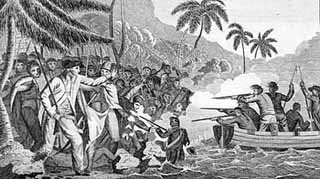
The death of Captain James Cook at Kealakekua Bay, Hawaii. (Archival photograph by Sean Linehan, courtesy of the National Oceanic and Atmospheric Administration.)
Instructor(s)
Prof. Susan S. Silbey
MIT Course Number
21A.110
As Taught In
Spring 2003
Level
Undergraduate
Translated Versions
Course Description
Course Highlights
This course includes a general guide to reading social sciences texts effectively, located in the study materials section.
Course Description
This course introduces students to some of the major social theories and debates that inspire and inform anthropological analysis. Over the course of the semester, we will investigate a range of theoretical propositions concerning such topics as agency, structure, subjectivity, history, social change, power, culture, and the politics of representation. Ultimately, all theories can be read as statements about human beings and the worlds they create and inhabit. We will approach each theoretical perspective or proposition on three levels: (1) in terms of its analytical or explanatory power for understanding human behavior and the social world; (2) in the context of the social and historical circumstances in which they were produced; and (3) as contributions to ongoing dialogues and debate.


